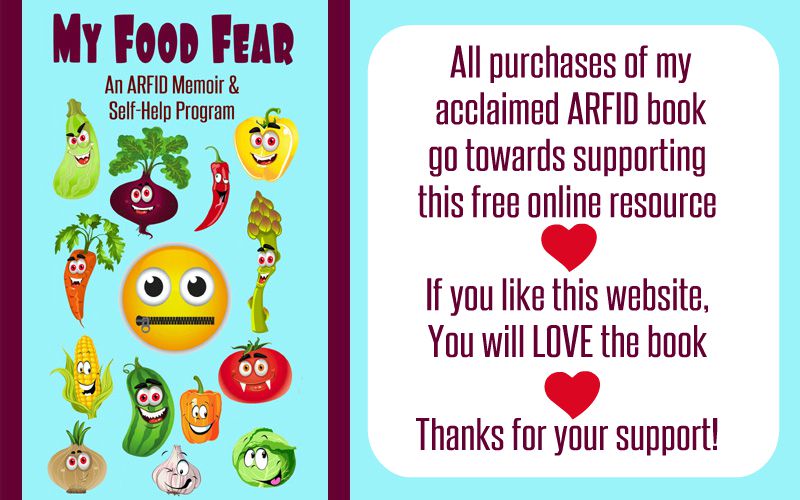Food neophobia describes a fear of eating new foods. Among food phobias, this is certainly one of the most common, affecting many people throughout life. While there is nothing inherently wrong with being hesitant to try new foods, some people take the practice to an extreme and wind up only eating an extreme narrow selection of food items. This is called avoidant restrictive food intake disorder or ARFID.
What makes trying new foods so scary? There must be some psychological reason why so many people are fearful of the unknown when it comes to food. Is it possible to open your mind to new eating experiences and overcome food neophobia? Yes, indeed it is! I am living proof! After suffering from extreme ARFID for over 37 years, I now consider myself a very adventurous eater! Who would ever think it was possible? Certainly not I…
What is Food Neophobia?
Neo means anything new. Therefore, neophobia describes a fear of trying new foods which are unfamiliar. People often have no reason for this fear, but desperately hold onto it nevertheless. For example, I never had a bad experience eating any type of food as a child. However, I clung to only a few foods that I enjoyed and absolutely refused to try anything new. This is not uncommon for a young child, but for me, the behavior persisted into my late 30s.
Fear of new foods is commonplace. People often make assumptions about foods from the way they appear or smell, their origin or the due to the people who tend to eat them. In these cases, there is something (or many things!) about the food which strikes the person as unappealing. The reaction can range from mild distaste to extreme anxiety at the mere thought of eating the food and even becoming sick if presented with the opportunity to partake.
Other times, people avoid new foods out of real fear of having a bad digestive reaction. This is particularly common in people with a history of GI troubles, such as bloating, GED, ulcers, IBS, diarrhea, gas and other digestive woes. Some people have no such problems, but have specific fears about food cleanliness, food preparation or some other issue that prevents them from trying and enjoying the food.

Food Neophobia Profiles
The vast majority of people who suffer from food neophobia are young male children. Most children who develop this habit do so very young, between the ages of 2 and 4. I actually remember the evolution of my weird eating habits from the age of 2. (I detail the progression of it in My ARFID Story, if you are interested in a first person perspective, with a bit of humor thrown in…)
Many people grow out of food phobias as they mature and lose their childhood inhibitions. However, many people do not. I was NOT one of these fortunate people who learned that food was good. Instead, my eating habits became even worse and more restrictive as I reached adulthood and gained independence by living on my own.
For people who do not overcome serious cases of food neophobia, life can become problematic. Some people face physical health issues due to their restricted eating habits, while almost all suffer psychological and especially social consequences. I always felt bad about my eating habits and really wish I knew just how common ARFID was when I was living the hell of an incredibly restrictive diet every day of my life for 37 years…
Food Neophobia Solutions
It is certainly possible to overcome all manner of eating disorders. However, the desire to want to change is the most important factor in who will succeed. If you do not want to expand your diet and try to eat better, then you will not seek the help that might be available to you. It is that simple.
I get many parents here who are concerned about their children. The most common question I receive is:
“How can I get my child to eat?”
Unfortunately, there is no cookie-cutter solution and most of the methods used by well-meaning parents tend to backfire. I can say that the more my family did to get me to eat, the less I actually wanted to do so. In fact, even as an adult, the more pressure anyone put on me to conform to normal eating practices, the more I rebelled and went deeper down my weird food rabbit hole. It must have been some sort of ego-driven imperative at many points in life, since I almost welcomed the conflicts, even though I hated my own eating habits! Thankfully, all that nonsense is well behind me and has been put to rest.
The point is to be careful about trying to get others to eat, even if you have their best interests in mind. Getting them professional help from a specialist in treating eating disorders might be the best course of action, but even this path is far from fool-proof.
The main point of this post is simple: It’s ok to be fearful. You might want to change the way you eat, but change takes time, effort and patience. You might not want to change at all and simply want to know if anyone else in the world is as “weird” as you. In that case, the answer is a resounding “Yes!” Many, many people have various forms of avoidant restrictive food intake disorder. You are not alone and you must take some solace in that!

Leave a Reply
You must be logged in to post a comment.